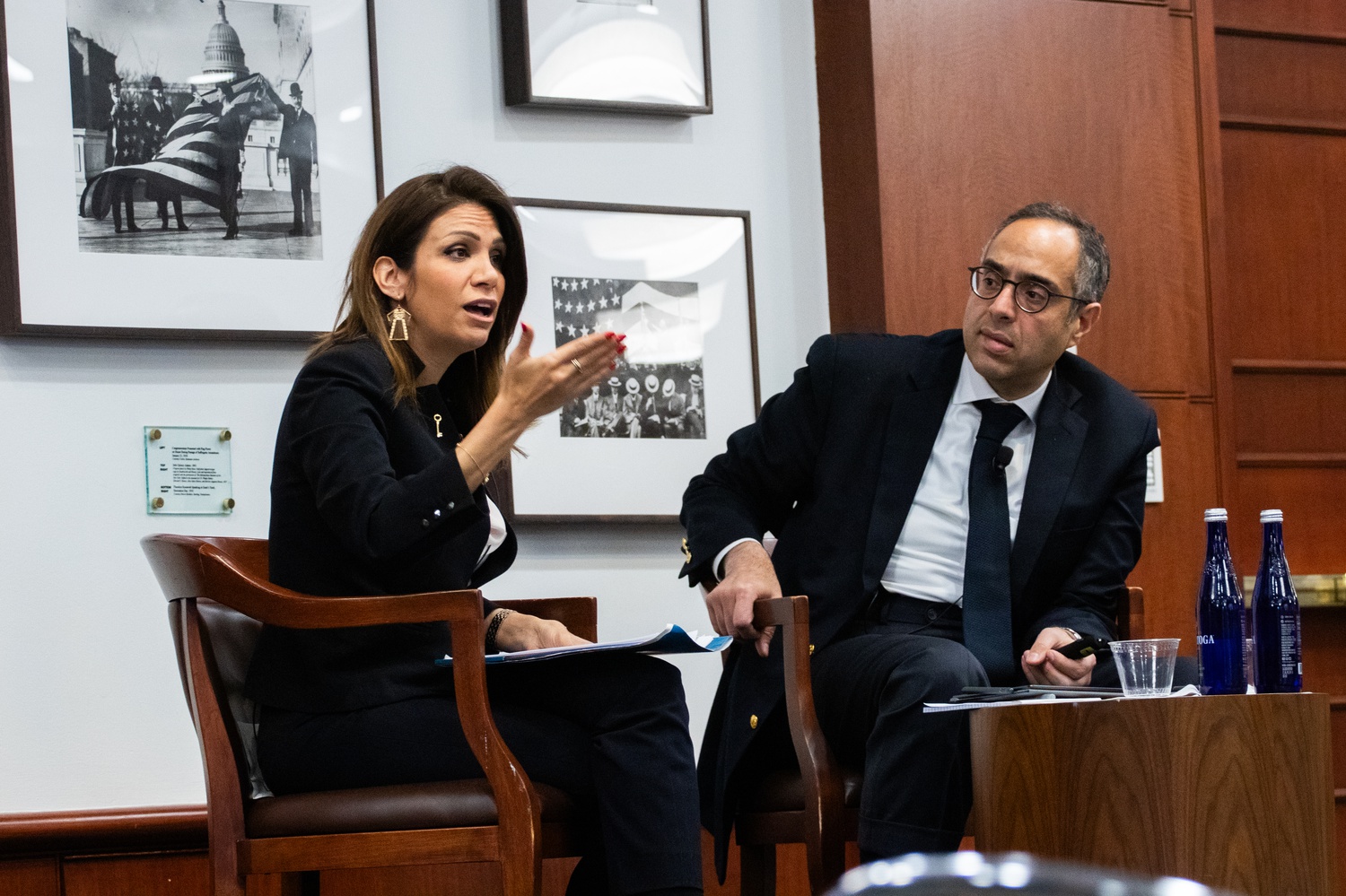
News
When Professors Speak Out, Some Students Stay Quiet. Can Harvard Keep Everyone Talking?

News
Allston Residents, Elected Officials Ask for More Benefits from Harvard’s 10-Year Plan

News
Nobel Laureate Claudia Goldin Warns of Federal Data Misuse at IOP Forum

News
Woman Rescued from Freezing Charles River, Transported to Hospital with Serious Injuries

News
Harvard Researchers Develop New Technology to Map Neural Connections
Palestinian Prof. Defends Controversial Posts at Harvard Kennedy School Talk on War in Gaza

Updated: Friday, March 8 at 11:55 a.m.
Dalal Saeb Iriqat, a professor at the Arab American University Palestine, defended her controversial social media posts about the Oct. 7 attack on Israel and the war in Gaza at a Harvard Kennedy School event Thursday moderated by professor Tarek E. Masoud.
Masoud’s decision to invite Iriqat to HKS sparked controversy early last month, with pro-Israel critics blasting her X post that described the attack as a “normal struggle 4 #Freedom” and calling for her invitation to be retracted. Amid the backlash, HKS Dean Douglas W. Elmendorf distanced himself from the event in a statement calling Iriqat’s views “abhorrent.”
During the event, Iriqat defended her post, saying that when she posted it, “nothing was reported on any casualties, no kidnapping, no nothing.”
“All we had been receiving was images of Palestinian young, elderly, children just fleeing into the border defense to try to break the siege — to try to break the deadly blockage — and see that they have been suffering from for 17 years,” Iriqat said. She added that the post “should not be interpreted as justifying violence against anybody.”
Iriqat added that she was “shocked” by the criticism she faced from HKS and Elmendorf.
“I have all the respect for Tarek that he continued with the talk,” she said. “Yet, when I read the comments of the Dean, I was just really shocked.”
“For a scholar to comment with such judgments without coming back to me, without inquiry, without climbing the ladder of inference — it simply lacks the basic one-on-one element of being an academic,” Iriqat added.
Elmendorf declined to comment on Iriqat’s criticism.
The talk — which concerned the historical underpinnings of the Oct. 7 attack — is the third installment in Masoud’s “Middle East Dialogues” series, which hopes to foster “hard conversations” on the ongoing war in Gaza, according to Masoud.
Iriqat said she chose to speak at HKS because Masoud’s initiative is “needed more than ever.”
“For me coming to Harvard was really a responsibility, an obligation,” Iriqat said. “I thought we have failed as Palestinians for so long in communicating our own narrative of ourselves, and that Harvard is a great institution and it’s a great opportunity.”
“This is not a periodic flare up,” Iriqat said Thursday. “This is a reflection of 76 years of apartheid, of Israeli military occupation, of settler colonialism.”
During the discussion, Masoud and Iriqat disagreed over Hamas militants taking hostages during the Oct. 7 attack.
Though Iriqat acknowledged that taking hostages is prohibited by international humanitarian law, she called Hamas’s hostage-taking “coercive diplomacy.”
“This is a tactic that has been used throughout history,” Iriqat said. “It has been used as a tactic in diplomacy in putting more pressure in the negotiations.”
However, Masoud pushed back, citing “an asymmetry” between Iriqat’s characterizations of Hamas’s hostage taking and Israel’s attacks in Gaza.
“When Hamas takes women and children hostage, it’s ‘coercive diplomacy.’ When Israel responds to it militarily, it’s suddenly a violation,” Masoud said.
Iriqat said she was not defending the taking of hostages, but rather arguing that “it’s wise to try to see how different negotiating parties would use hostages in the negotiation processes.”
Iriqat added that she was “not a fan of Hamas” and she was “speaking about the Palestinian people.”
She said there was a “big difference” between advocating for “the Palestinians’ right to struggle under the Israeli occupation” and endorsing a “certain ideology” about the conflict.
Masoud and Iriqat also discussed the importance — and difficulty — of building empathy between Palestinians and Israelis, with Masoud noting that there is a “deep lack of empathy” between the two.
Iriqat said that though she can “empathize with the shock” of Oct. 7, the impact of the war in Gaza has had a longer-lasting impact on Palestinians.
“October 7 started and ended for the Israelis on October 7,” Iriqat said. “But on the Palestinian side, it’s still ongoing, up until this moment.”
—Staff writer William C. Mao can be reached at william.mao@thecrimson.com. Follow him on X @williamcmao.
—Staff writer Dhruv T. Patel can be reached at dhruv.patel@thecrimson.com. Follow him on X @dhruvtkpatel.
Want to keep up with breaking news? Subscribe to our email newsletter.
